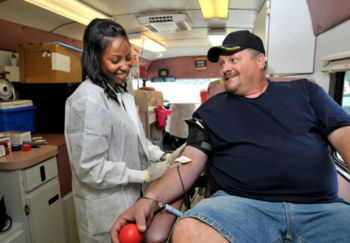 Donating an organ or blood is one of the most precious and lifesaving gifts one can give, and a way to make a difference. The need is certainly there; According to Donate Life America, 114,000 people are currently waiting for organ transplants.
Donating an organ or blood is one of the most precious and lifesaving gifts one can give, and a way to make a difference. The need is certainly there; According to Donate Life America, 114,000 people are currently waiting for organ transplants.
Depending on the type of cancer, your current medical condition, and how long you’ve been living without cancer, it is possible to be a donor. If you’re living with cancer or have gone through treatment, here’s what you need to know about organ and blood donor disqualifications and requirements.
Organ Donation
Your history of cancer doesn’t automatically disqualify you from donating an organ. According to the American Cancer Society, cancer is rarely passed on from donor to recipient. However, the organ transplant team and medical professionals at your healthcare center will determine what organs can or cannot be used, based on strict medical criteria and your condition at the time of death.
In general, whether or not you qualify to donate your organs depends on the type of cancer and how long you’ve been cancer-free. For example, individuals with primary brain tumors that have not spread beyond the brain stem are generally eligible to donate organs. Individuals with active cancer, including newly diagnosed patients, are likely excluded from donating. Your cancer status may also impact whether or not you can be a living donor — someone who donates a kidney or part of a liver.
Blood Donation
In general, it is safe for cancer patients or those with a history of cancer to donate blood. According to the American Cancer Society, there have been no reported cases of transmitting cancer via a blood transfusion.
Like organ donation, individuals with a history of cancer may be permitted to donate blood, depending on whether their cancer is currently active, the date of their last cancer treatment, and how long they have been cancer-free. For example, some blood donation centers may require that it’s been one year or more since your last cancer treatment and that the cancer has not returned. These guidelines are to protect the safety and health of both the donor and recipient.
Each blood donation center has different standards for blood donors, but blood donor disqualifications include:
- Active treatment for cancer
- Cancer recurrence or spread
- Leukemia or lymphoma as an adult, including Hodgkin lymphoma
- Kaposi sarcoma
Those whose cancer has been surgically removed and require no other treatment are not restricted from donating blood. They just need to heal from their surgery and feel healthy.
Interested in Organ Donation?
If you have a history of cancer and are interested in donating an organ or blood, talk to your doctor to find out whether you qualify. Learn more about organ donation at UVA.
Eye Donation
In addition to donating your organs and blood, it is possible to donate your corneas to help preserve or restore someone’s sight. The best part? Everyone is a universal donor, according to Donate Life America. You don’t have to match the recipient’s blood type, eye color or age. Except for cases of eye or certain blood cancers, patients with a history of cancer can donate their corneas.
If you do want to become an organ donor, list that preference on your driver’s license. Tell your family about your wishes to donate, too, as they may have to give consent for your donation. But first, consult your cancer care team and physician about your specific medical case and how it may impact your qualification as an organ or blood donor.
